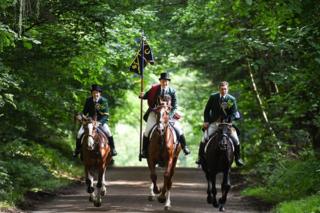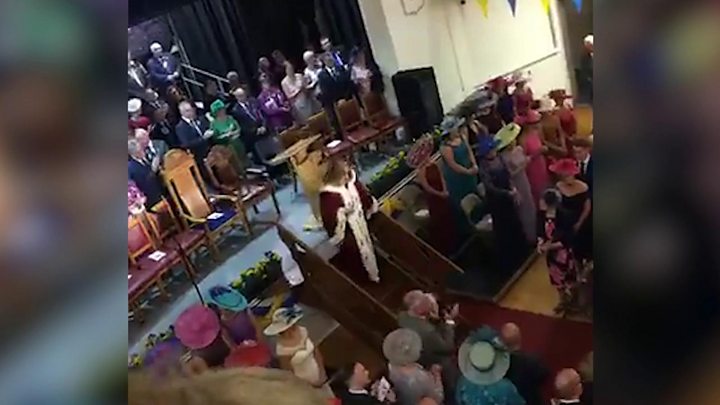[ad_1]

Image copyright
Getty Images
Hawick Common Riding celebrates the history of the Scottish Borders town
One of Scotland’s most historic summer festivals is being urged to reform amid accusations of sexism and intimidation.
Hawick Common Riding could lose thousands of pounds worth of funding following a series of complaints about behaviour towards women.
They include claims that some female participants faced discrimination, derision and hostility at the event.
Festival organisers said they had held a “constructive and positive” meeting with senior council officials.
Organisers said they were working to “rectify the situation” after complaints led to the withholding of a £9,300 grant from Scottish Borders Council.
The row comes more than 20 years after two young women first defied convention and joined Hawick Common Riding.
Women no longer face physical barriers and protests but a small group of local “lady riders” claim they still cannot enjoy the unfettered access enjoyed by men.

Media playback is unsupported on your device
Following this year’s event, Scottish Borders Council received 29 emails of complaint from 12 people, mostly related to behaviour directed at female participants.
The accusations include:
- One female official was booed and had paper and a water bottle thrown at her as she left an official ceremony
- “Venom” was directed at lady riders taking part in ceremonial events by people including committee members and former principals
- Complainers said the behaviour ranged from being ignored to being booed, heckled, sworn at and called a “disgrace”. One woman said she felt unsafe
- When the behaviour was directed at riders in the presence of committee members and marshals, no action was taken
- Speeches at previously male-only gatherings were addressed to “gentlemen” and ignored the presence of women
- Hawick Common Riding committee failed to promote the participation of both men and women
- The committee had not dealt properly with the complaints it had received.
The local authority is now withholding an annual grant until it is satisfied the committee has dealt with the matter.
In emails obtained by BBC Scotland under Freedom of Information laws, the council’s chief legal officer, Nuala McKinlay, outlined the issues.
“There is concern that… women were on some occasions tolerated but more often ignored or even derided,” she wrote to the common riding committee.
She asked that they publish a “very positive statement” welcoming all women to the festival.
An email dated 30 July 2019 said that eight complaints were outstanding.
What is Hawick Common Riding?
Image copyright
Getty Images
Until recent years, the Hut has been an exclusively male preserve
The first of a series of similar events held across the south of Scotland every summer, Hawick Common Riding celebrates the capture of an English flag in 1514 – shortly after the Battle of Flodden – by the youth of the town at Hornshole.
It also marks the ancient custom of riding the marches, or boundaries, on the common land.
The election of the Cornet – a young, unmarried local man – in May marks the beginning of a five week schedule of ceremonies, ride-outs, re-enactments, rituals and picnics.
For many local residents it is the highlight of their year, the importance of which cannot be easily explained to outsiders.
Lisa Mackay says she takes part in the common riding to “honour and recreate history”.
“It’s a real privilege to be up on the hills on a horse and that’s probably the main reason that I do it,” she said.
The women ‘problem’
Ashley Simpson and Mandy Graham took part in the common riding in 1996
Despite being a predominantly male occasion in the past, women riders did take part in the early 1900s. They were only banned after 1931, when one woman fell off her horse and broke her leg.
When Ashley Simpson, 23, and Mandy Graham, 21, made clear their intention to join the men of Hawick on horseback in 1996, they faced protests and anger in their hometown.
But they won a court battle and eventually the lady riders reached a compromise – they would ride a number of preliminary ride-outs, but would not follow the cornet in ceremonial rides or attend events like the “picking night” smoker or the celebrations at St Leonard’s Hut.
The common riding dinner and ball, the colour bussing ceremony and exiles night – a reception for former residents of Hawick – have always been open to men and women.
“Traditionalists” blocked the lady riders from joining the common riding in a high profile protest in 1996
The compromise held good for almost 20 years until in 2018 the first women took part in the Thursday night chase. It was filmed for a BBC Scotland programme, The Common Riding.
As a registered charity and the recipient of public funds, the common riding committee has signed up to equality rules forbidding it from preventing protected groups – like women – from attending its events.
In addition, it must eliminate both direct and indirect discrimination, victimisation and harassment, promote equal opportunities and foster good relations between groups.
What happened this year?
Gillian Morgan is a vocal campaigner for women’s equal access to the common riding. Video circulated on social media shows she was booed and had ripped paper thrown at her as she left the colour bussing ceremony.
“I didn’t know it was coming but nothing surprises me,” she told BBC Scotland. “I think I’m so used to this type of abuse that I don’t particularly like it but I have to sit back and think I’m not going to let you get the better of me.”
Gillian Morgan, a common riding baillie, was the target of abuse at the Colour Bussing
It came the night after the Cornet and the Cornet’s Lass were presented with a controversial gift from Hawick Community Council. Instead of the traditional trinkets to commemorate their experience, a donation was made in their name to the Scottish Borders Rape Crisis Centre.
The move sparked an outcry and Ms Morgan, as then-chairwoman of the community council, was the focus of some anger. She was targeted at the colour bussing ceremony, while a local crowd-funding appeal raised more than £1,300 which paid for gifts for the principal couple and a number of other charitable donations in their name.
“I knew it was different but I didn’t really expect the reaction that there was,” Ms Morgan said. “I think they’ve taken it as if we’re having a dig at men – and that wasn’t the case.”
Another woman who takes part in the ride-outs told BBC Scotland she was verbally abused while on horseback outside Hawick town hall. Police said a 75-year-old man had been charged and would be the subject of a report to the procurator fiscal.
The woman, who asked not to be named, said the intimidation of lady riders was “far more subtle” than it has been in the past, and she had been left to feel like a “second class citizen”.
She said it had caused rifts between friends and families.
‘It’s not just about equality’
Image copyright
Mackay family
Lisa Mackay was one of the first women to take part in the ceremonial Chase in 2018
Lisa Mackay complained that the Cornet did not recognise the accomplishments of women – including her 15-year-old daughter – who completed one of the most gruelling challenges of the common riding.
She said he read out the names of only the men and boys who completed the Mosspaul ride-out, during an event in St Leonard’s Hut.
“It’s not just about equality,” she said. “Not mentioning a kid who’s gone out there and ridden 30 miles for you, it’s about being a decent, neighbourly human being.”
She said her overall experience of the common riding was better than last year, when she received a threatening phone call after taking part in a ceremonial ride-out.
“There’s still a lot of things you could complain about but this is a great town, with great people and they’ve been – this year – very, very good to me,” she said.
The vet added: “I love living here. The village has raised my children, I have a great life, a well-paid job and the people of Hawick afford me that lifestyle.
“But when it comes to the common riding, it’s all just forgotten about. You’re on your own, you’re out on a limb.
“I wish folk could just actually talk about it but there’s no mediation, there’s no willingness to engage in discussion to take it forward.”
What next?
Withholding the £9,300 festival grant is unlikely to put in jeopardy the future of Hawick Common Riding – in 2018 it had reserves of more than £200,000.
But it is a symbolic blow to the committee which insists “everyone is welcome” to the festival yet urges the community to respect its “customs and traditions”.
Campaigners want to see women actively welcomed to events like the congratulatory smoker, a traditionally male-only party celebrating the selection of the new cornet.
Image copyright
Getty Images
Some women are selected to act as “principal ladies” and attend certain events at the common riding
Neighbours and local school children spill out into the street to see the cornet taken from his home to the event – but his female relatives are not expected join him for the occasion.
One of a handful of women who broke convention to attend this year’s event said: “When else in his life would his mum not be there? His P1 teacher? Everyone who has meant something over the years? Everyone who is excited?”
Scotland’s charity regulator, the OSCR, said it was also considering concerns about equality issues at Hawick Common Riding.
Scottish Borders Council said it held a “positive” meeting with the common riding committee on Wednesday and the local authority has suggested a “possible way forward”.
What does the common riding committee say?
Image copyright
Getty Images
A small number of women have begun going to St Leonard’s Hut – once reserved strictly for men
BBC Scotland made repeated requests to speak to Hawick Common Riding committee but they did not respond.
However Cameron Knox, the committee’s chairman, referred to the issue at its annual general meeting on Thursday.
He said this year’s common riding made a loss of £10,000 because the council grant had not been paid.
A meeting with the council’s chief executive and chief legal officer on Wednesday was “constructive and positive”, he added.
“We are now working along with the council to rectify the situation for this year and for the future,” he said.
Mr Knox also condemned “faceless keyboard warriors” who had criticised him and other office bearers on social media.
“These certain people must remember that Hawick Common Riding is bigger than any of us. It will continue for hundreds of years to come and that, ladies and gentlemen, is a fact.
“Hawick Common Riding committee looks forward to welcoming everyone – and we mean everyone – to Hawick Common Riding next year.”
[ad_2]
Source link


